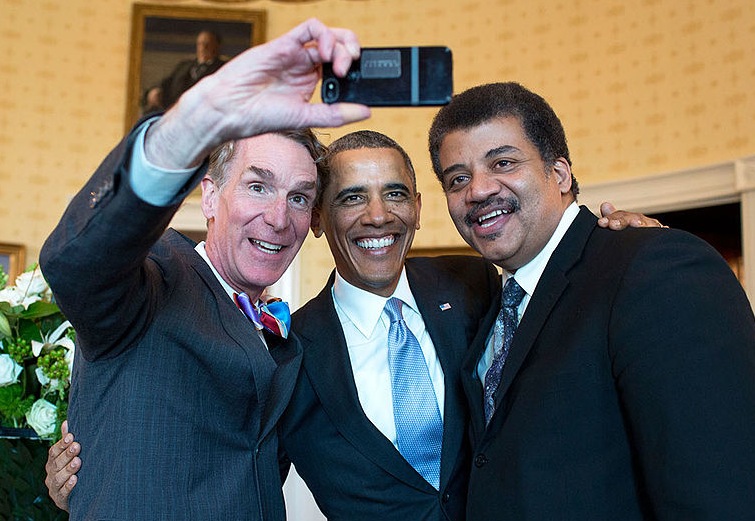The Discovery Institute is usually a reliable source of humorous “breathtaking inanity,” and this Darwin Day I wasn’t disappointed by its seasonal contribution to the festivities. 
Well, I was disappointed for my own sake, since yet again I did not win the Discovery Institute’s “Censor of the Year” award, which is much coveted by those of us who hold the radical notion that science is awesome. But once I overcame my feelings of loss, I turned to examine the person they chose for this curious honor: Neil deGrasse Tyson. And then the inanity swept over me.
Huh? Neil deGrasse Tyson? What terrible act of censorship does the Discovery Institute say he committed?
Maybe Tyson personally intervened at the publisher HarperOne to prevent it from publishing Stephen Meyer’s latest “intelligent design” book. That would certainly qualify as censorious behavior. But Meyer’s book Darwin’s Doubt is for sale on Amazon, where it is doing so well it ranks #3 in the “Christian Books & Bibles>Theology>Creationism” category.
Perhaps Tyson was able to censor the latest book by “intelligent design” advocate William Dembski, Being As Communion: A Metaphysics of Information. (It’s always a bad sign when the title sounds like a random word salad.) But it seems that Tyson’s alleged censorious pull isn’t worth much with publishers these days, because you can buy Dembski’s book on Amazon as well, though as of today it’s ranked #119,897, which might have something to do with it containing sparkling sentences such as: “Given that information is a logarithmic transformation of probability, we therefore define the amount of information in an arbitrary event E as I(E) = -log2P(E).”
No, in the strange alternate reality of “intelligent design” advocates, Neil deGrasse Tyson has become a notorious censor simply by appearing in his own television series.
Tyson’s Cosmos series ran between March and June of last year, winning four Emmys and much praise from critics. So how does hosting a successful television series make one a “censor”?
The Discovery Institute explains the reasoning behind their Censor of the Year award:
COTY, as it’s called for short [by anyone who discusses it, apparently limited to the Discovery Institute itself], recognizes achievement in thwarting an open and informed discussion of science and scientific controversies.
Tyson’s Cosmos series, the piece goes on,
… tells a seductive story that leaves out complications and controversies around science, and casts materialism as the obvious inference from the scientific data.
I must assume, then, that in order to correct this apparently egregious misrepresentation of science, the Discovery Institute has plans to finance, produce, film, edit, distribute, and publicize its very own television series to counter the deficiencies of Tyson’s Cosmos. It is perfectly free to do so; such a series might even find an audience, given the U.S.’s abysmal levels both of taste and of science literacy.
No real or imagined censor is blocking such a project. Hell, if the Discovery Institute did make such a series, I would probably watch it, in the same sort of way that one is compelled to look at a car wreck, or any movie with Lindsey Lohan in it. (I watched Expelled, after all, and it’s hard to imagine that the Discovery Institute could sink to depths any lower.)
But if the Discovery Institute were to produce an alternative Cosmos, would this series include criticisms of its ideas? Would Jerry Coyne and Francis Collins and Richard Dawkins and Kenneth Miller be invited as guests to explain why “intelligent design” is wrong? Because that, in reverse, is exactly what the Discovery Institute seems to have expected Tyson to do in Cosmos. If the Discovery Institute version of Cosmos did not include devastating critiques from scientists, wouldn’t it then be “censoring” and “thwarting an open and informed discussion”?
The Discovery Institute concocts a right to ride Neil deGrasse Tyson’s coattails, and then cries foul when his show is a success and it is “left behind.” But in science you have to earn the right to be part of the discussion. Sputtering indignation doesn’t get you anywhere.
And Cosmos left out a lot of ideas. The theory of phlogiston, for example.
The theory of phlogiston, as you might recall, was a once widely-accepted idea that some yet unobserved substance—phlogiston—existed in objects that could be burned. And when combustion occurred, phlogiston was liberated. It’s a nice idea, but it’s dead wrong.
So why didn’t Tyson devote loads of time in Cosmos to the theory of phlogiston? Because the idea failed. Science has moved on. Fairness does not require that Tyson now spend equal time contrasting the idea of stars powered by nuclear fusion versus the idea that stars burn phlogiston.
For Tyson to give serious consideration to “intelligent design” would be the equivalent of giving serious consideration to phlogiston. “Intelligent design” had its chance to make a case and try to generate meaningful research. (A single sign of its failure is that in 2014 the “intelligent design” journal BIO-Complexity managed to publish exactly one “research article”—while there were easily over 3000 scientific papers on evolution published in the same year.) The idea failed. Science has moved on. Fairness does not require giving pseudoscience equal time—especially when the demand comes from envious strangers for a show that they had no part financing or creating.
It’s not censorship. It’s just the marketplace. Some ideas fail.
